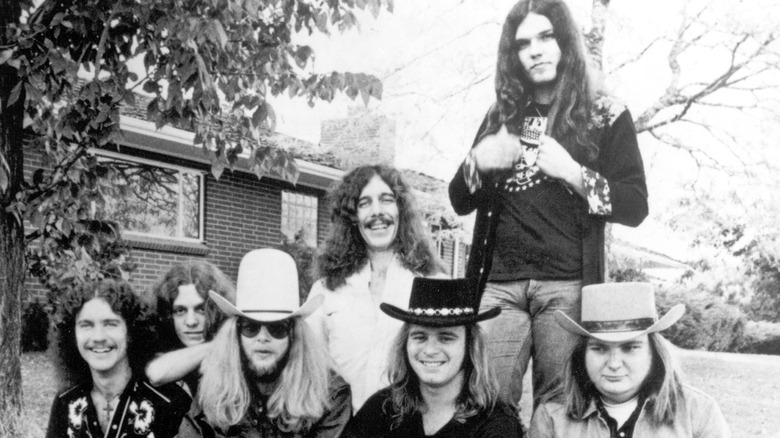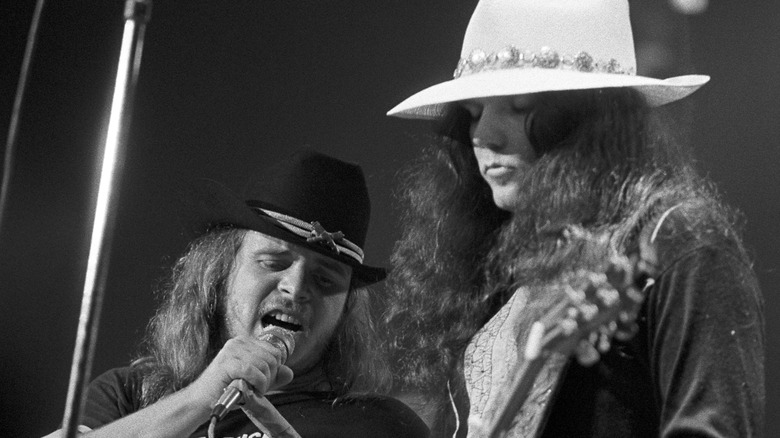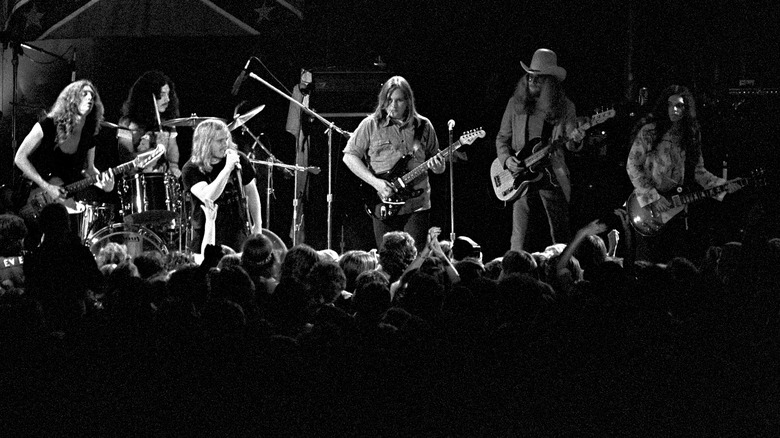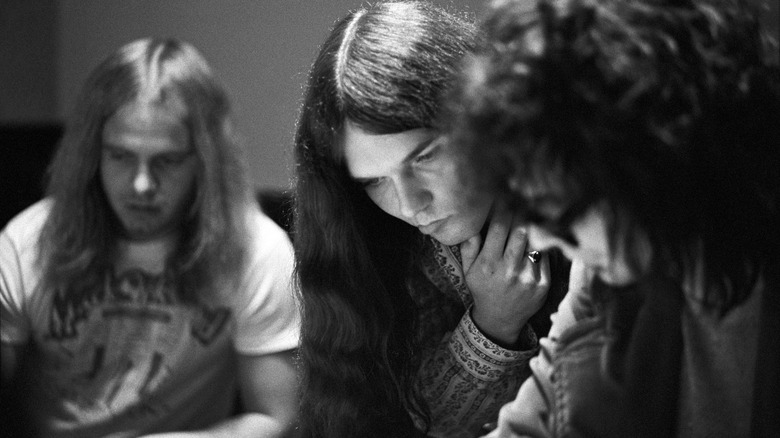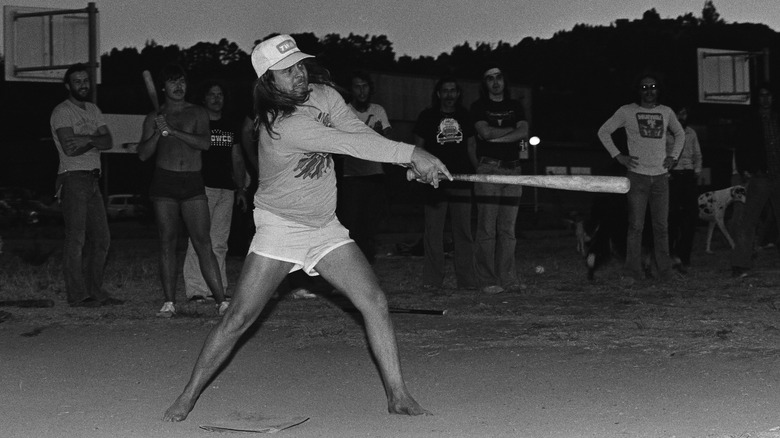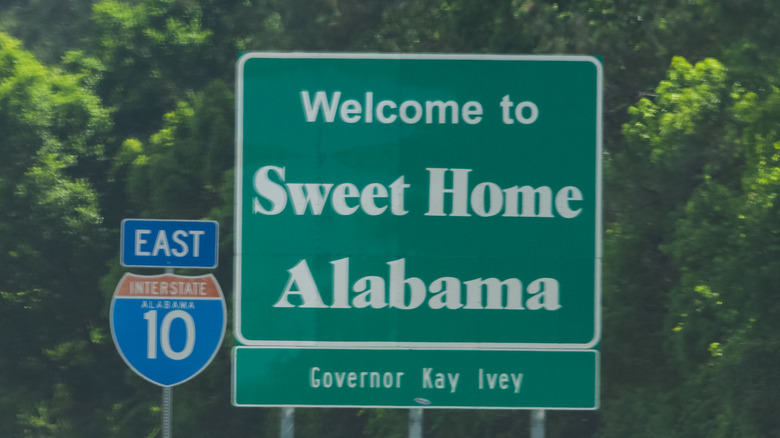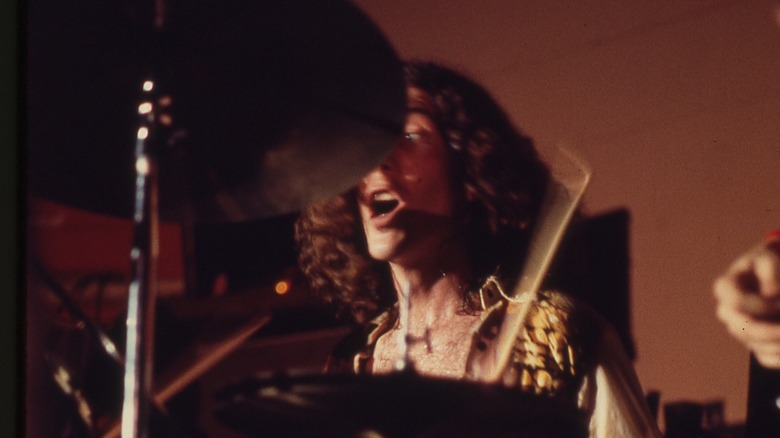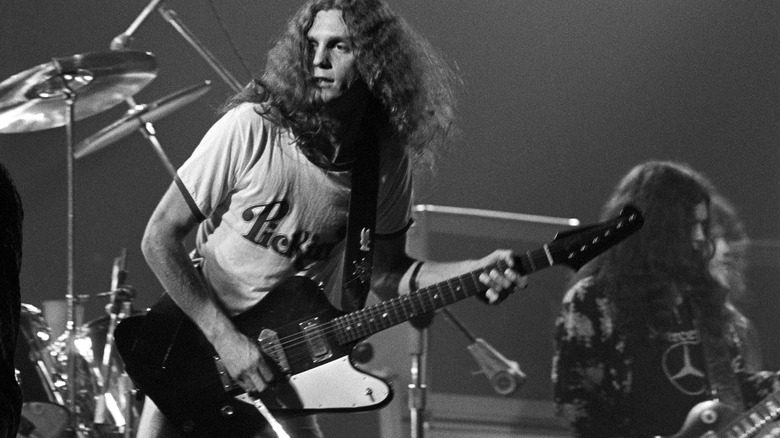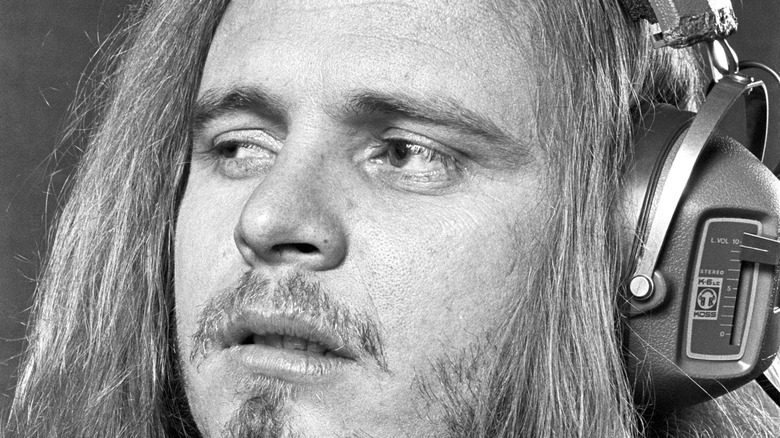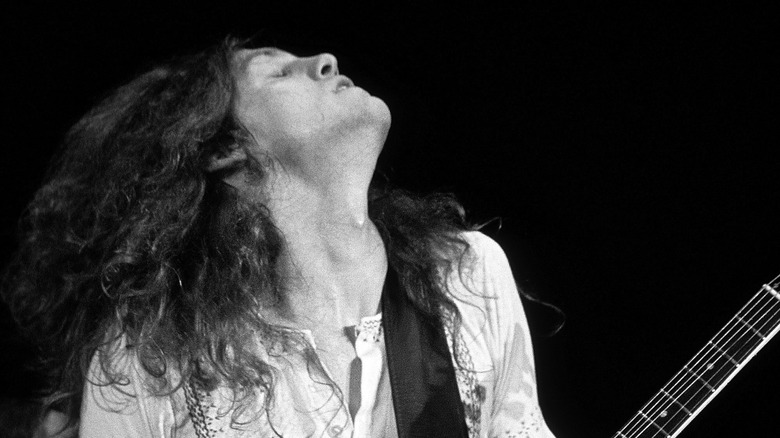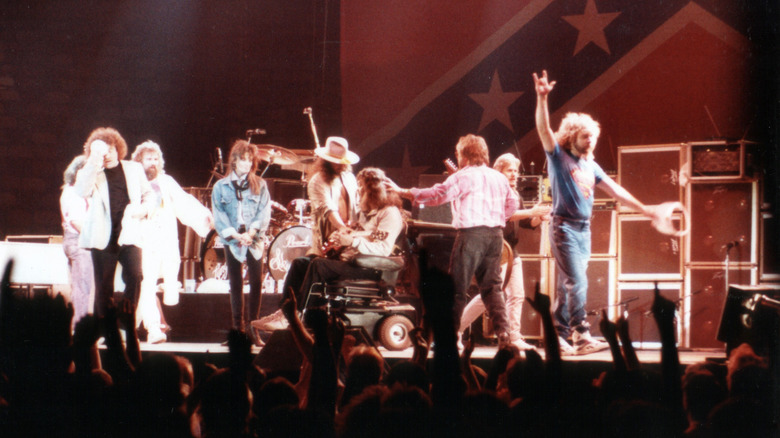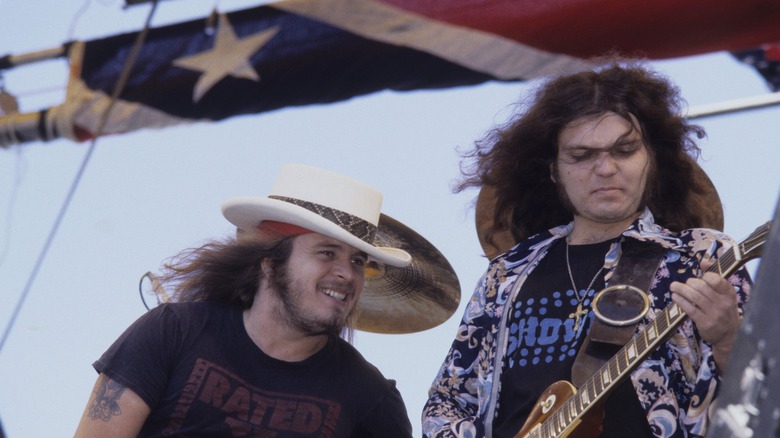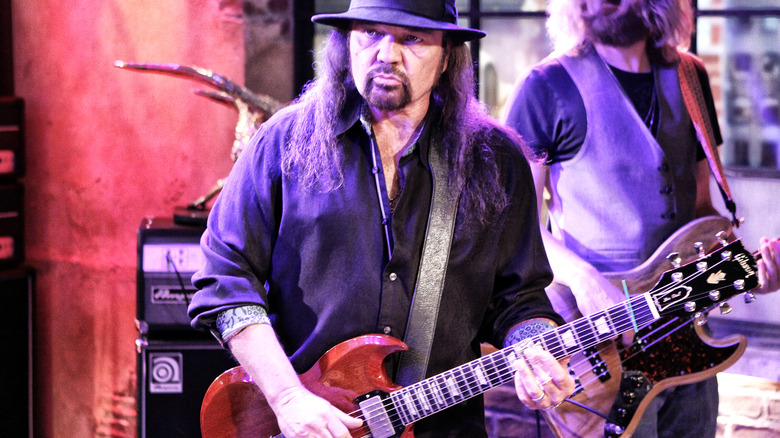The Tangled History Of Lynyrd Skynyrd
The American South has several strong musical associations. Jazz, blues, and soul all originated from the region, it's closely tied to the country genre, and it's easily suggested in film and TV scores by a few notes from a banjo. But there is also Southern rock as a distinct subgenre within rock and roll. And the band that is arguably most responsible for defining the sound of Southern rock is Lynyrd Skynyrd.
First formed in 1969 in Jacksonville, Florida, Lynyrd Skynyrd went from a local group offering a cocktail of country, rock, and blues to a seminal act of the 1970s music scene. "Sweet Home Alabama," Free Bird," and other singles from the band have become genre staples. With various configurations of members, they've remained active into the 2020s, with their latest tour running through spring and summer 2023 (per the band's official website).
But more than many other band, Lynyrd Skynyrd has faced setbacks and tragedies, most dramatically in the loss of three of its members in a 1977 plane crash. With the death of Gary Rossington in March 2023, none of the original members remain alive. And their decades in the music business haven't come without a few strange twists.
They formed after a baseball accident
Two founding members of what became Lynyrd Skynyrd did not want to be rock stars as teenagers. Ronnie Van Zant (left), who was the band's first vocalist, and Gary Rossington (right), guitarist, aspired to futures with America's national pastime. Rossington told his family he wanted to head north and play for the New York Yankees when he was older, and Van Zant was on the cusp of entering minor league baseball when he shifted his career goals. Growing up, both boys played for local teams in Jacksonville, Florida.
In the summer of 1964, Van Zant was playing a game attended by Rossington and his friend Bob Burns, another young baseball enthusiast. According to Marley Brant's "Freebirds: The Lynyrd Skynyrd Story," while up to bat, Van Zant hit a line drive that beaned off Burns' head, knocking him out. They and Rossington soon became friends.
Besides baseball, the trio shared a love for music, particularly rock. Without a thought to future work, they put together a rock band, with Burns as the drummer. They were joined not long after by Allen Collins, another guitarist. Unlike the others, Collins was not a baseball enthusiast, and he was already determined to be a rock player. Gradually, the others came around to that career path.
They went through a lot of names
Lynyrd Skynyrd is set apart by its name. The improbable spelling led to their rather tongue-in-cheek first album title, "(Pronounced 'Lĕh-'nérd 'Skin-'nérd)." But it wasn't the first, or the second, thing that the founding members of the band thought to call themselves.
Ronnie Van Zant, Gary Rossington, Bob Burns, and Allen Collins first came together as a band in 1964, under the name My Backyard. That was soon changed to the Noble Five. Then it was a string of names that included the Wildcats, Conqueror Worm, Sons of Satan, and the Pretty Ones. Name changes were frequent and almost never according to anything more than a whim. One Percent stuck around a while; the boys saw a group of bikers sporting the phrase and took a shine to it. But when it started giving hecklers ideas, Van Zant decided a change was in order.
According to the documentary "If I Leave Here Tomorrow" (via Rolling Stone), the new name, Lynyrd Skynyrd, was partly inspired by a line from the Allan Sherman song "Hello Muddah, Hello Faddah." But it was also a mocking tribute to Rossington's high school gym teacher. Leonard Skinner was a strict disciplinarian who regularly chastised Rossington for his long hair, something Rossington said motivated him to drop out of school. The real Skinner didn't recognize his name or his former student when Lynyrd Skynyrd's fame took off, and he never liked rock and roll. But he told The Augusta Chronicle in 2009 that he had eventually befriended some of the band members, and even introduced them at a Jacksonville concert.
Ronnie Van Zant clashed with the band's producer
Lynyrd Skynyrd were already making a name for themselves in the American South when songwriter and music producer Al Kooper (right) chanced to see their show in Atlanta, Georgia. As he would later tell the story for Classic Rock, Kooper first worked his way into sitting in with the band for a few gigs, then began a long persuasion campaign to get them to sign with him. He won them over, not with a lucrative offer or irresistible creative arrangement, but with a $5,000 loan when the band's instruments were stolen.
When it came time to act as producer for the band he'd chased so doggedly, Kooper found himself in regular conflict with the group's leader. Ronnie Van Zant, despite his inexperience in the recording studio, was firmly in control of Lynyrd Skynyrd and kept a clear vision for what he wanted the band to be. Kooper, a seasoned musician by that time, supported the group but brought in definite opinions based on his experience. Both men were confrontational, and their arguments could get heated. But Van Zant respected Kooper's input and his discipline in the recording studio, and Kooper could admit when he was wrong. He initially opposed including the song "Simple Man" on the group's first album, but came around once it was recorded and provided an organ line.
They wrote under the influence of mushrooms
When Lynyrd Skynyrd was first formed, the band practiced at the home of whoever's mother was willing to endure them. But neighbors, and the local police, weren't always so accommodating. After one too many noise complaints, the band tired of being interrupted and decided to find somewhere more secluded to rehearse.
The place they found became known as Hell House, an abandoned shed in the swamps near Jacksonville, Florida. It had a tin roof, no air conditioning, and was surrounded by wildlife. After a late-night robbery, members of the band took turns guarding their shed and equipment. But Gary Rossington told Rolling Stone that Lynyrd Skynyrd's first two albums were almost entirely written in Hell House.
According to the 2018 documentary "If I Leave Here Tomorrow" (via Rolling Stone), they were written with some help from the local fauna. While they wrote and practiced, the band enjoyed tea brewed from mushrooms they found nearby. This led to a few hallucinatory practices, with floating keyboards and visible music notes.
The bandmates drank, did drugs, and fought each other
The original members of Lynyrd Skynyrd weren't the first or the last set of rock stars to have a wild time after reaching the big leagues. But their wild times awed even other rock and rollers. "They're like the scariest rock band ever," Dave Wyndorf of the band Monster Magnet told Spin, "because they really, totally believed it." Lynyrd Skynyrd drank together, did hard drugs together, and often fought together.
Fights between members sometimes ended with them going on stage with visible injuries and knocked-out teeth. They fought ahead of gigs, on the road, and out in public. A particularly nasty brawl in a Hamburg bar ended with Gary Rossington's hand shredded by broken glass and Ronnie Van Zant's hands broken.
As leader of Lynyrd Skynyrd, it fell to Van Zant (pictured) to break up fights and administer discipline. Several years older than his bandmates, he acted as a stern father figure who kept the band's sound focused. But Van Zant was as wild as the others when it came to drugs and drink, and just as violent. Disciplinary action could mean more fighting. True fatherhood, and a few outrageous bills for damages, made him reconsider some of his rowdiness by 1976, but even then, Van Zant told Los Angeles Times reporter Cameron Crowe (via The Uncool) that his partying days weren't over.
'Sweet Home Alabama' was their only single to crack the Top 10
The original incarnation of Lynyrd Skynyrd produced several hit singles, but only "Sweet Home Alabama" made it into the Billboard Top 10. The song has been embraced by the state. The University of Alabama's football team uses it for a fight song, and the band were made honorary Alabama state militia lieutenant colonels in 1975. But if it weren't for that song, none of its writers would have any connection to Alabama.
Lynyrd Skynyrd formed in Florida, where Ronnie Van Zant and Gary Rossington were from. Ed King, the third writer on the song, was originally from California. None of them had lived in Alabama. They were inspired to write the song, Van Zant told the Los Angeles Times (via The Uncool), by Neil Young's "Southern Man." While Van Zant was a fan of Young's, he found the lyrics of "Southern Man" to be an unsophisticated caricature of the South's worst reputation, written by a non-southerner. "[It was] more of a joke than anything else," Van Zant said of "Sweet Home Alabama," one that Young appreciated. But besides its popularity at football games and on classic rock stations, the song has attracted sometimes confused interpretations. Critics, and even its writers, have not been able to consistently portray it as a pro-Southern pride anthem or a rebuke to racist elements of the Old South embodied by the likes of George Wallace.
Bob Burns left the band because of mental health issues
Bob Burns was with Lynyrd Skynyrd from the beginning. When the band hadn't even settled on the first of its many names, he was its drummer, and he filled that role for years, save for a few months when the 15-year-old Burns had to move away with his parents in 1969. And he indulged in all the usual temptations of the rock star life, the same as his bandmates.
But Burns struggled to cope with that degree of excess, and with the professional demands that came with being part of an active, touring rock band. He was still in his teens when Lynyrd Skynyrd left for a European tour in 1975; within weeks, his mental health began to suffer. Neither Burns nor his bandmates were prepared to deal with a mental health crisis at the time. With no other obvious choice, he left the band, booze, and hard drugs behind.
Burns was later diagnosed with bipolar disorder, which he told Examiner he managed with therapy and Prozac. Leaving Lynyrd Skynyrd didn't mean leaving behind its members, who were childhood friends of Burns. He remained in touch with them over the years, and even rejoined them for a one-time performance to mark their induction into the Rock and Roll Hall of Fame. In 2015, he was involved in a car accident and died of his injuries.
Before the plane crash, there was the car crash
The hedonistic life of a rock star caught up to Gary Rossington (pictured) in 1976. At that stage in his life, he was regularly mixing alcohol and Quaaludes. Under their influence, he got into a car crash in his hometown of Jacksonville, Florida. His injuries threw off Lynyrd Skynyrd's touring schedule for the year, something the band fined him for. As the most dramatic consequence of the intensifying effects of their carousing, the accident reinforced a sense frontman Ronnie Van Zant had that Lynyrd Skynyrd was in for trouble.
Under the influence of various drugs himself, Van Zant nevertheless agreed with Allen Collins that Rossington's accident merited a song. He claimed in an interview (via American Songwriter) that he wrote the lyrics for "That Smell" while using cocaine and heroin. Without saying Rossington's name, the words to the song note the negative effects his drinking and drug use had on him, and they referenced the car accident.
"That Smell" didn't immediately snap Rossington or anyone else in the band out of their drug use. After the band's plane crash the following year, Rossington struggled with addiction to painkillers. But he survived his years with drugs and alcohol and eventually reached sobriety.
No one wanted to continue Lynyrd Skynyrd after the plane crash
One of the great tragedies in the history of rock and roll is the October 20, 1977, plane crash of Lynyrd Skynyrd. The band had just released their album "Street Survivors" and were flying to their next tour date when the plane crashed in Mississippi. Besides the pilot and co-pilot, the casualties included assistant road manager Dean Kilpatrick, guitarist Steve Gaines and his sister Cassie, and Lynyrd Skynyrd frontman Ronnie Van Zant (pictured).
Van Zant had regularly predicted that he wouldn't live to see 30, so his family and surviving bandmates weren't as shocked as they might have been at his death. But he was the undisputed leader of Lynyrd Skynyrd. He set the band's style, wrote or co-wrote most of their greatest hits up to that point, and acted as an older mentor figure to most of the group. His fate wasn't immediately disclosed to the survivors, all of whom suffered serious to severe injuries. Gary Rossington and Allen Collins, who had been at the front of the plane with Van Zant, suffered survivor's guilt. Only one member was fit enough to attend Van Zant's memorial.
Without Van Zant, and with their own long roads to recovery, the survivors saw no future for Lynyrd Skynyrd. According to Spin, Rossington, Collins, and Van Zant's widow Judy entered a formal legal agreement the next year to dissolve the band. For nine years, Lynyrd Skynyrd was gone.
Gary Rossington and Allen Collins fell out over a woman
Two years after the 1977 plane crash that killed Ronnie Van Zant and sent Lynyrd Skynyrd into a seemingly permanent dormancy, guitarist Allen Collins (pictured) did his best to get the music playing again. Though he and the other crash survivors all suffered severe injuries, they wanted to keep playing. The new group was called the Rossington-Collins Band, for Collins and fellow guitarist Gary Rossington.
The Rossington-Collins Band was a success, but hovering over its work were lingering issues from the Lynyrd Skynyrd days, drug and alcohol issues, and fresh tragedies. Collins' wife died during the band's first promotional tour, affecting his creative output. And he and Rossington, friends since high school, fell out over their competing affections for their lead vocalist, Dale Krantz.
Krantz chose Rossington. She told the Florida Times-Union (via Jacksonville.com) that she was the one who proposed; Rossington answered with "Okay." They married in 1982, and the marriage lasted until the end of Rossington's life. But the year they wed was the year the Rossington-Collins Band disbanded. Collins formed the Allen Collins Band and kept playing for a few years, but after a car crash in 1986, he was left paralyzed from the chest down and unable to play.
The reformed Lynyrd Skynyrd broke a legal agreement
Allen Collins was paralyzed and estranged from Gary Rossington when the 10th anniversary of the Lynyrd Skynyrd plane crash came up in 1987. The band's old record label, MCA, wanted to commemorate it in some way. However the survivors felt about the anniversary, several of them were in hot financial water. Using former bandmates Leon Wilkeson and Billy Powell as intermediaries, Collins — who was a joint rights holder to the Lynyrd Skynyrd name — reached out to Rossington about putting something together.
The new Lynyrd Skynyrd was led by Rossington but had Ronnie Van Zant's brother, Johnny, as the lead vocalist. Randall Hall took over for Collins' guitar lines; Collins himself wasn't in shape to do more than come out onstage for a few quick words. Old and new faces filled out the rest of the roster. A brief tour during 1987 completely sold out. But the reconstituted band violated an agreement Collins and Rossington had made with Van Zant's widow to retire the Lynyrd Skynyrd name for good after his death.
Judy Van Zant went to court after an unsuccessful effort to oust her from the band's decision making. The complicated settlement she reached with Lynyrd Skynyrd gave her a significant financial stake and a strong decision-making presence, one not always appreciated by the players. More than a decade later, Rossington publicly complained about Judy's cut, and what he felt was her stifling control over the band's image (per Florida Small Business).
The band has a complicated relationship with the South
Lynyrd Skynyrd is deeply tied to the American South. It was founded in Florida, its most prominent members are southerners, and one of their most famous songs celebrates a Southern state none of the song's writers ever lived in. But the character and reputation of the South has evolved over the years, and Lynyrd Skynyrd's connections to the region have sometimes been controversial.
The original Lynyrd Skynyrd came to prominence during a time marked by the New South, an effort by Southern states to heed the civil rights movement and find a new identity. The band has been counted as a force in that movement, but their concerts and promotional materials made extensive use of the Confederate flag for years. The lyrics to "Sweet Home Alabama," specifically what stance it takes on George Wallace, have been interpreted various ways. Ronnie Van Zant claimed before his death that the band had no deliberate or consistent political stance.
Since Van Zant's death, interpretations of Lynyrd Skynyrd's politics and their representation of the South have remained confused. Rolling Stone described them as more conservative, based on the lyrics of "God and Guns." But the band has also responded to fan protests and largely abandoned Confederate imagery.
The original members are all gone
If you go to a Lynyrd Skynyrd concert or listen to a new release from them, as of 2023, you won't find any representatives of the band's original 1969 lineup. Ronnie Van Zant died in the infamous 1977 plane crash. Allen Collins, forced out of music by injuries from a car crash, died in 1990 of pneumonia. Bob Burns, who retired for his mental health, died in a car accident in 2015.
For years, the one founding member to remain with Lynyrd Skynyrd was guitarist Gary Rossington (pictured). He became the leader, albeit not always the most forceful one, of the band after Van Zant's death and kept playing his guitar line even as the personnel around him changed. By 2020, with old age settling in for Rossington and other members, Lynyrd Skynyrd prepared a farewell tour, meant to end their lengthy treks around the country while still leaving the door open for new records and the occasional live show.
But Rossington's health was failing with age. He required quintuple bypass surgery in 2003 and struggled with heart trouble afterward. Even before the farewell tour began, shows were canceled due to his medical issues, as happened in Cascades Park in 2017 (per the Tallahassee Democrat). Rossington died on March 5, 2023, with no cause of death given.
